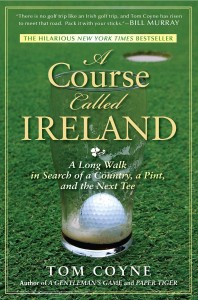As part of our alumni interview installment, we chatted with Notre Dame alum, Tom Coyne (1999) about his latest projects, golf, advice for students, and other exciting news in his life. Here’s what he had to say.
 thrill since it’s a magazine I’ve been reading for any number of years now. Notre Dame is fortunate to have a community magazine that is still publishing essays and thoughtful content on a large scale, and in a handsome magazine. I’m also working on a new project for Sports Illustrated called “The Dream Tee.” I basically got tired of tracking down all my own golf dreams (or perhaps I’ve run out of them), so I wanted to do a story where I’m making someone else’s dream happen. I’m asking for submissions from readers for their dream foursome — if you could golf with any three people, who would it be? — and I’m writing a feature about the experience of arranging and playing the foursome for an SI issue in June. And I’ve started a new golf book with Simon & Schuster. We are still very much in the planning stage, and we are going back and forth between a few ideas that might be a good follow-up to A Course Called Ireland. Book will be out in 2015, fingers crossed.
thrill since it’s a magazine I’ve been reading for any number of years now. Notre Dame is fortunate to have a community magazine that is still publishing essays and thoughtful content on a large scale, and in a handsome magazine. I’m also working on a new project for Sports Illustrated called “The Dream Tee.” I basically got tired of tracking down all my own golf dreams (or perhaps I’ve run out of them), so I wanted to do a story where I’m making someone else’s dream happen. I’m asking for submissions from readers for their dream foursome — if you could golf with any three people, who would it be? — and I’m writing a feature about the experience of arranging and playing the foursome for an SI issue in June. And I’ve started a new golf book with Simon & Schuster. We are still very much in the planning stage, and we are going back and forth between a few ideas that might be a good follow-up to A Course Called Ireland. Book will be out in 2015, fingers crossed.
I notice you write a lot about golf. Is there a background story behind how that inspired your work? What other influences inspire your writing?
I didn’t set out to be a golf writer–if that’s what I consider myself. It was sort of an accident that grew out of workshop. I spent most of my time in the MFA at ND writing fiction that I thought sounded important or impressive, trying to win the approval of my peers with stuff that sounded smart and vague and foreign enough to fit in the New Yorker. It was all crap. It wasn’t until I started writing about things closer to me–things I really cared about, and knew something about, that I found some confidence and a voice. I started writing a short story about a caddy, since I had grown up caddying. The story grew into another, which grew into chapters, which turned into a novel that I submitted as my thesis. That thesis, A Gentleman’s Game, was my first book and was made into a movie. Offers came in to write for golf magazines, and to do another golf title. So I was a golf writer, without really planning to be one. But fiction is my love and my training, and if I’ve had any success in writing about golf, I believe it comes from the fact that I approach it as a writer who cares about craft, and not a golfer who cares about where the ball goes. But golf has been very good to me. Golfers buy books. Or at least people buy books for them as gifts. Father’s Day keeps the lights on.
How did you decide you wanted to become a writer?
I loved to write from a very young age. I hate it when people start with that, because it makes me wonder if I started early enough, or if I’m some pretender among child writing prodigies. But I did write stories when I was a kid — I’d take words out of the dictionary and try to fit them into a story. The stories made no sense, but I remember reading them to family or to the class and loving the approval that came from that. So I was an approval-seeker from a young age, and since I had more success with my writing than my peers, it seemed the best way to keep the approval coming. I never really considered writing as a career until later in college, when I was publishing stuff in various campus outlets. Again, more approval, and I started to think that maybe I could actually do this forever. I went to graduate school as the first step in figuring out if that was possible. The encouragement I got there suggested that it was. Then I gave myself a year to peddle the novel I had written and see if I could make it. We sold it pretty quickly, and suddenly I was a writer. So I guess I didn’t really want to be a writer until I was, when I finally felt safe to want the writing life.

